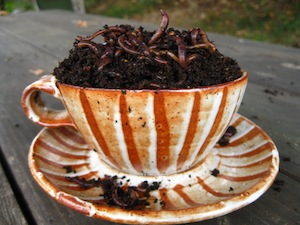Tea for Plants / Tea for the Planet
nourish your earth, plants and people
What is Compost Tea?
Much like herbal teas, compost tea can simply be described as a water extraction of compost; compost soaked in water to extract the many beneficial nutrients and more importantly the diverse micro-biology present in good quality compost. Once suspended into a liquid solution, the beneficial organisms in the liquid compost can easily be applied to soil, turf, leaf surfaces, compost heaps, ponds or other natural systems.
Why Compost Tea?
"The point of applying compost tea is to return the biology that should be present, to grow the desired plants with as little effort as possible. There can be no question that presence of beneficial organisms improves plant growth" -Dr. Elaine Ingham et al, 1985, USDA Soil Biology Primer, 1995.
Home brewed compost teas are very affordable to produce and serve as a probiotic or a living fertilizer. Compost teas are a useful tool for building a productive and healthy soil ecosystem. Compost teas provide a healthy alternative to toxic chemical fertilizers and can be used on lawns, vegetable gardens, annuals, perennials, houseplants, shrubs, trees, orchards, forests, and vineyards with no threat to pets, livestock or humans.
What does Compost Tea Do?
Compost tea and compost extracts act as a probiotic for your soil. Digestive health is essential for the proper conversion and assimilation of nutrients from our diet. Much like within our digestive tract, it is a diversity of key organisms within the soil that aid in the digestion or decomposition of organic matter and the conversion of nutrients into forms readily available to plants. The collective biology at work in soil is responsible for building humus, soil structure, assisting with water and nutrient retention, as well as the recycling and mining of nutrients and minerals. Compost extracts and actively aerated compost teas can improve the digestive health of your soils by inoculating them with billions of beneficial microbes.
Building a diverse biologically active soil ecosystem will help to improve the health and productivity of your farm and gardens. Specific organisms (fungi, bacteria, protozoa, nematodes, etc.) present in mature biologically active compost have been identified to aid in plant health and the suppression of pathogens and disease. Compost teas can help provide a protective barrier from disease and pests throughout a plants root and leaf zones by out competing pathogens and parasitic organisms for food resources.
"The problem in agriculture has not been a lack of nutrients, but a lack of the proper biology to make those nutrients available to plants." -Dr. Elaine Ingham, Soil Foodweb, Inc.
What is the difference between compost tea, compost extract, and actively aerated compost teas (AACT)?
The term compost tea is used, broadly at times, to describe a variety of liquid compost and mineral solutions. Ideally, compost tea should be a cultured biologically active liquid compost possessing a full-diversity of the biology present in compost.
Compost extracts can be made in minutes and applied immediately, making them very convenient if there is not enough time to brew aerated tea. A compost extract is simply compost mixed in water. Compost extracts will provide a similar concentration of the microbes found in your starter compost. You can use compost extracts as a soil drench, root dip when transplanting or to inoculate; compost heaps, potting and planting mixtures. These are very convenient for people without an aerator (Brewer)
Actively Aerated Compost Tea (AACT) is a water extraction of compost using high volumes of oxygen to culture a greater population of organisms than in the starter compost. Active aeration helps to maintain a highly aerobic environment in compost teas. Actively aerated compost teas provide a more precise cultivation and extraction of the beneficial organisms present in the compost. Aerated compost teas can be fed specific ingredients to cultivate select microbial life present in the mature compost. The increased oxygen levels and select foods added to aerated compost tea act as a catalyst feeding the diversity of organisms into an accelerated population growth. Actively aerated compost tea can be applied as either a soil drench or as a foliage spray to all plant types.
For further reading on brewing and working with compost tea we recommend the following books.
The Compost Tea Brewing Manual - by: Dr. Elaine Ingham
Further info on Compost Tea
The links below will take you to studies, stories and other sites with great information on the use and effects of compost teas.
- "The Soil Biology Primer" from the USDA Natural Resource Conservation Service
- Soil Foodweb Inc. - This is Dr. Elaine Ingham's website and maybe the resource on compost tea.
- Microbe Organics – This site is operated by Tim Wilson and covers microscopy of compost teas. He has a DVD available that show the different beneficial microorganisms in compost teas and compost, as well as a uniquely designed commercial tea brewing systems.
Here are some great articles from the folks at Gardening with Microbes

